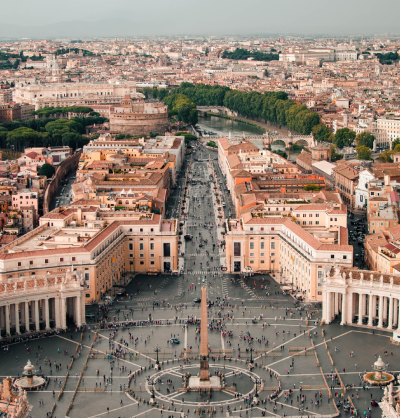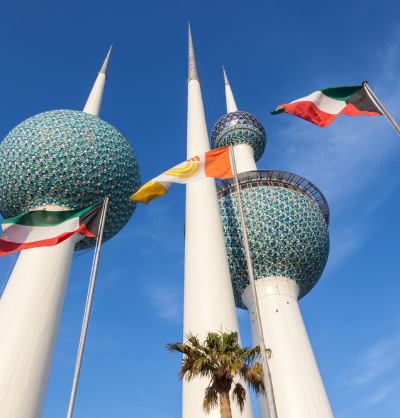This, the 13th edition of our StratEGIC monthly, looks at some of the key issues defining the Euro-Gulf space in February 2023 and focuses on how the GCC countries are broadening their horizons in relation to certain fields such as: nuclear energy, interfaith dialogue, space missions and the intensification of relations between the GCC and Europe—in this case through the enhancement of cooperation with Italy.
The First Interfaith Building in the Gulf Inaugurated in Abu Dhabi
by Piercamillo Falasca
The Gulf’s first interfaith building, aptly called the Abrahamic Family House, was inaugurated on 15 February 15 in Abu Dhabi. As H.H. Sheikh Mohammed bin Zayed Al Nahyan stated on Twitter, the complex is dedicated to advancing ‘mutual respect, comprehension, and diversity.’ The Abrahamic Family House is comprised of three cubic buildings and stands on Saadiyat Island, the cultural district of Abu Dhabi, and comprise a Jewish synagogue (the Moses Ben Maimon Synagogue), a Catholic church (His Holiness Francis Church) and an Islamic mosque (the Imam Al-Tayeb Mosque), all designed by British-Ghanaian architect Sir David Adjaye. The entire complex spans 6,500 sqm and is coloured in an off-white hue, built in a mixture of concrete, marble and oak. The equal volumes of the three houses are meant to reflect metaphorical harmony among the three religions. Yet there are clear differences in each building’s design, symbolic of the faith represented. Each house, for example, is orientated differently owing to its particular seating needs and direction of prayer. The church faces towards the east and the rising sun. The Moses Ben Maimon Synagogue is looking towards Jerusalem, while the Imam Al-Tayeb Mosque faces Makkah.
The UAE and Fellow Gulf States’ Space Exploration
by Ashleigh White
On 2 March, UAE astronaut Dr Al Neyadi will depart for a six-month expedition to the International Space Station. The launch, originally scheduled to have departed on 27 February, was delayed due to weather issues, will be the Arab world’s longest space mission. Dr Al Neyadi is a part of NASA and SpaceX’s Crew-6 mission which will launch from the Kennedy Space Centre in Florida. This project comes three years after the Emirates’ first astronaut Hazza Al Mansouri entered space on a much shorter trip. Dr Al Neyadi’s mission, named UAE Mission 2, is the next step in the UAE’s efforts to grow and expand their space programme. Al Neyadi will be the second Emirati astronaut to travel to space, and only the fourth Arab in space. The UAE is also the first Arab nation to reach Mars and build and launch a Moon rover, in 2021 and 2022 respectively. However, the UAE is not the only GCC state taking steps to develop projects in space exploration and research. A team of astronauts from Saudi Arabia is set to join Dr Al Neyadi at the International Space Station later this year. These missions show a growing interest in international space exploration by the GCC. Also, the upcoming launch signals an important milestone in the UAE’s mission to expand regional and international influence. In the past decades the UAE has become a major player in the international financial and energy sectors and we can expect to see more historic space explorations from the UAE along with other Gulf states.
Saudi Arabia Moves Forward with its First Nuclear Plant
by Piercamillo Falasca
Saudi Arabia is pushing forward with its plans to construct its first nuclear power plant and has received a number of bids. Saudi Arabia has had an interest in nuclear power for decades, as it was a major investor in Pakistan’s nuclear programme that began in the 1970s. More recently, Saudi Arabia has been considering developing nuclear energy for peaceful purposes. In December 2022, the International Atomic Energy Agency (IAEA) held a nuclear law workshop with Saudi officials in Riyadh in order to ‘support the implementation of its nuclear energy program in a safe, secure and transparent manner,’ according to a press release. In early February, Saudi Arabia signed an MOU with France on energy cooperation and it mentions nuclear energy as well as hydrogen and electricity interconnection—according to the Saudi Press Agency. Saudi Arabia’s nuclear push fits with the country’s diversification strategy.
Italy’s Relations with the Arab Gulf
by Veronica Stigliani
At the beginning of February, Italian Defence Minister, Guido Crosetto, paid an official visit to the United Arab Emirates for a series of institutional meetings. This corresponded with a telephone call between Italian Prime Minister, Giorgia Meloni, and Saudi Arabia’s Crown Prince and Prime Minister, Mohammed bin Salman (MbS). In Abu Dhabi, Crosetto met with his counterpart, Mohammed bin Ahmed Al-Bowardi, to discuss ways to boost bilateral relations, especially in the security sector. The meeting focused on regional challenges in a bid to coordinate Italy’s and the UAE’s position towards them. Crosetto also held talks with Tareq Abdul Raheem Al-Hosani, Secretary General of the Tawazun Council, the UAE Defence and Security Authority, to define long-term strategic goals. His visit aimed to mend relations following the previous Conte government’s decision to suspend arms exports to Abu Dhabi because of its involvement in the Yemen war. Meloni and MbS discussed opportunities for joint cooperation in several fields. The phone call was meant to recover its role in an area which is extremely strategic. Geographically contiguous, the challenges and the opportunities that emerge from the Mediterranean and the Arab Gulf have a direct impact on Italy. Moreover, the Italian intention to relaunch relations with the Gulf countries has to be read in the wider context: the ongoing conflict in Ukraine pushed Europe to search for new energy providers, in an effort to diversify from Russian supplies. The war designed a new international scenario which forced Italy to review its foreign relations. And the regional and international role of the Arab Peninsula makes the Gulf countries an indispensable interlocutor for a country which is determined to pursue its national interests in foreign policy.





